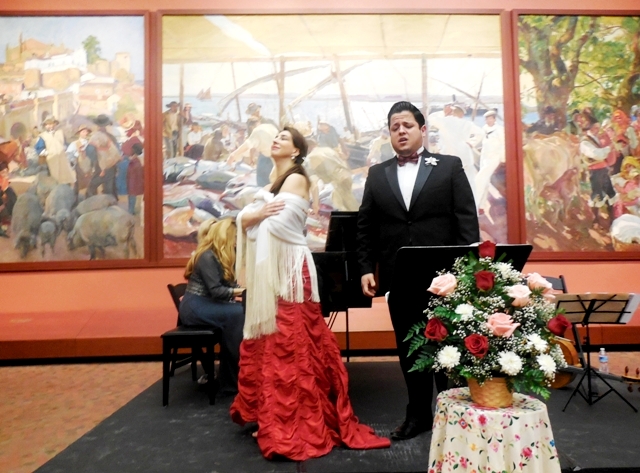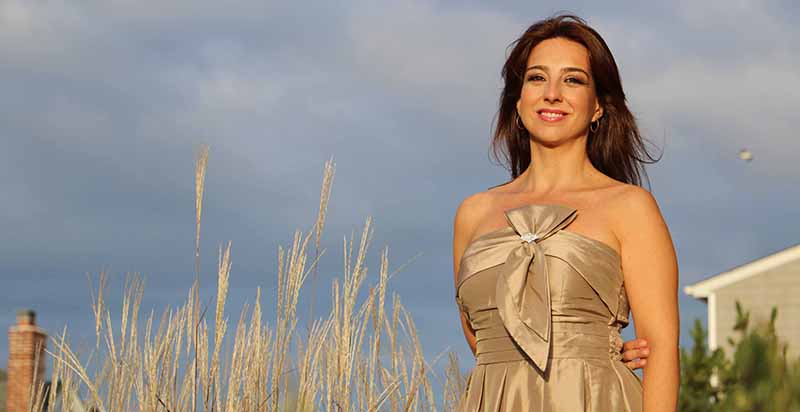Ander Egiluz Beramendi, USA. She answered the phone right after arriving back home from Bethesda, Maryland, where she performed Canzoni D’Amore at a private audition-show, in front of over a hundred people. She went there with the hope of making some contacts that could, eventually, open her some new doors in Washington D.C.
- How did everything go in Bethesda?
Everything went perfect, I wanted to meet people, and people to get to know me, and I did it. There were around 120 people in the audience, among them Jerome Barry, who curates the Embassy Series program, in DC. At the end of the show he approached me and said he really liked my voice and that he would like to book a tour for the next year.
- Congratulations! What did you sing?
Thank you very much. I performed Canzoni D’amore for a little bit more than an hour, including some operas and zarzuelas. I also sang Iparragirre’s Ume eder bat. I always include Basque pieces in my repertoire, for the people to get to know the music from our land.
- Usually you book your own shows, did you organize this one too?
Yes. I sent my proposal to Dominique Cardela, who organizes concerts for new artists in Washington DC, he liked it, and he invited me. The idea was to attract as many people as possible and, apparently, it worked. Now, my goal is to be able to do something at the Kennedy Center.
- At the end of February you went on tour to Puerto Rico. Was it a good experience?
It was a really good experience and, on top of everything, the great local guitarist Ivan Rijos played with me. I gave three shows, two in San German and one in San Juan. The public was new for me, didn’t know me, and that was very helpful.
- In what sense?
The most important thing is the people to get to know me and, having Puerto Rico such a great source of good artists, the fact that the audience was interested in me was a push. They really liked the show that included zarzuela, Italian music and, from the Basque Country, I included Haurtxo polita.
- What are your plans for the short- and mid-terms?
I have a very busy agenda and an even busier mind (she laughs). But one of the plans that I’m more excited about is that I want to take my ‘Basque Journey’ repertoire to the Basque Clubs of South and Central America. It’s a fusion of classic and popular music, with pieces by Sorozabal, Aita Donostia, Olaizola and Guridi, to name a few, and also Urko’s Guk euskaraz, Xabier Lete’s Kontrapas, Ken Zazpi’s Ilargia, Itoiz’s Lau teilatu, Mikel Laboa’s Txoria txori, the popular Ameriketara joan nintzen…
- What instruments would you like to accompany this project with?
I would like to use a classical instrument, like a piano, and a popular one, an accordion, for instance. The idea is the people to know the difference in the meaning between old and contemporary music. Before, music was full of melancholy for the homeland, from those who had to leave their homes in search of a better life. Nowadays, maybe in a more poetic way, musicians talk more about love, always adding a reference to our land. It’s more than just sung music, there’s a history behind.
- In Jaialdi 2010, you and Joxan Goikoetxea performed together, using both piano and accordion. Is ‘Basque Journey’ something similar?
There is a similarity in the sound, but the concept is different. Performing, with Joxan, at the Jaialdi, was a beautiful experience. I wish I could go this year too, but I don’t know if it’s going to be possible. At least I got the confirmation that I’m going to sing in China, I’m happy about it.
- In your career, you have always been accompanied by other singers and musicians of very diverse origins. Is that something you pursue in order to enrich your musicality?
That’s a very enriching thing to do, I like to shift from one style to the other and let new airs permeate me. There are always rhythms that are new to me, that’s why I try to work with different people. I have the ability to catch new sounds easily, because music is in ourselves, but it’s always a challenge and a pleasure.

- Speaking about challenges, at the concert you gave at the Hispanic Society of New York, at the beginning of February, you even danced onstage.
That was a dramatized concert, aimed at attracting an audience keen on, but not specialized in, classical music. That’s why we tried to do something new instead of a serious concert. Mexican tenor Cesar Delgado and Cuban musicians Ileana Cortizo and Ana Ruth Bermúdez also performed with me. The dance we performed is called Danzon, a very elegant dance from Cuba.
- Being a singer abroad you are also a sort of representative of your country, like the Basque Clubs are. How do you perceive the diaspora, especially the one in the US, where you live?
The Basque Club I’m most familiar with is the one from New York, and I can tell they make a big effort to organize events, even when the budget is limited. Another Euskal Etxea I like a lot is the Basque Cultural Center of San Francisco, it’s beautiful. In general, I’d say the Basque diaspora is very much alive.
If you want to know more about Amaya Arberas, visit her website.







 Send to a friend
Send to a friend Add comment
Add comment








